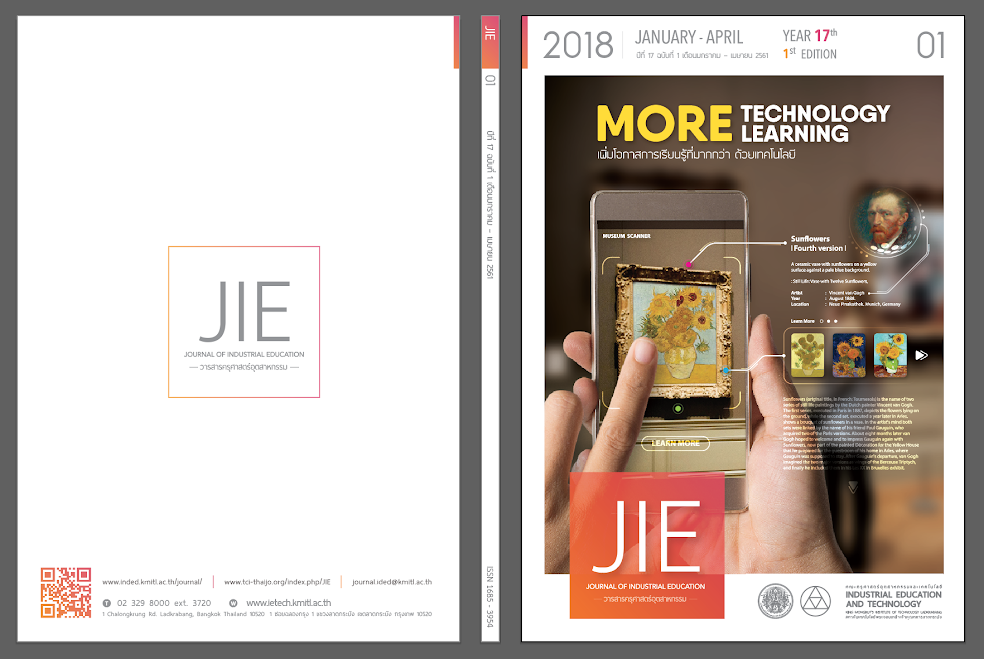DEVELOPMENT OF A COMPETENCIES BASED TRAINING FOR DEVELOPING STARTUP COMPETENCIES AMONG UNDERGRADUATES IN PRIVATE UNIVERSITIES
Keywords:
Competencies Based Training, Startup, CompetenciesAbstract
This research is purposed to develop Competencies Based Training (CBT) to promote capability of a novel Startup of undergraduates in Private University. The sample in this study was a group of 30 third-year students from Entrepreneurs College of The University of the Thai Chamber of Commerce. The research is divided into 3 phases. In the first phase, it develops the competencies in business management of the Startup. The second phase was a development of a short course training. The third phase is to evaluate the effectiveness and improve the short course training. The evaluation is conducted based on the objectives of each learning unit utilizing the mean of GPA at 3.00 from the full score of 5.00. T-test dependent sample is used to compare the different evaluation results between the pre-course and post-course.
The results in the first phase, found that 6 competencies of the Startup includes 1) Creative and innovative business design 2) Appropriate marketing strategy 3) Pitching concept business Startup and confidently 4) Dare to think and dare to decide. 5) Used innovation and technology. 6) Build a team and network. The second phase, found that the short course training was developed with a theoretical concept of competency based training based on action learning and work based learning.The third phase, found that the participants have learning outcomes based on the purpose of the 4 units of learning in the average score of 3.00 and above and the average score of the posttest was higher than the pretest, statistically significant at 0.05.
References
[2] Ries, E. (2011). The lean startup: How today's entrepreneurs use continuous innovation to create radically successful businesses. NY: Crown Business.
[3] Lertsakul, C. (2012). The Development of Competency Norm for Evaluating Characteristics of New Entrepreneurs in the Division of Cyber Business and Interactive and Multimedia Design, Ed.D. (Adult Education). Bangkok: Graduate School, Srinakharinwirot University.
[4] Graham, P. (2006). The 18 mistakes that kill startups. (Online) https://www.paulgraham.com/startupmistakes.html
[5] Blank, S. (2013). Why the Lean Start-Up Changes Everything. [Article]. Harvard Business Review, 91(5), 63-72.
[6] Kirzner, I. M. (1979). Perception, opportunity, and profit: Studies in the theory of entrepreneurship. Chicago: University of Chicago Press.
[7] Brockhaus, R. H., & Horwitz, P. (1986). The psychology of the entrepreneur. In D. Sexton, & R. Smilor (Eds.), The art and science of entrepreneurship, Cambridge, Ma: Ballinger.
[8] Podhisita, C. (2011). The Art and Science of Qualitative Research. 6 th ed. Bangkok: Amarin Printing.
[9] Begley, T. M. (1995). Using founder status, age of firm, and company growth rate as the basis for distinguishing entrepreneurs from managers of smaller businesses. Journal of Business Venturing, 10(3), 249-263. doi:10.1016/0883-9026(94)00023-N
[10] Covin, J. G. & Slevin, D. P. (1989). Strategic management of small firms in hostile and benign environments. Strategic Management Journal, 10(1), 75–87.
[11] Lumpkin, G. T., & Gregory G. D. (1996). Clarifying the entrepreneurial orientation construct and linking it to performance. The Academy of Management Review, 21(1), 135-172.
[12] Blank, S. G. (2006). The four steps to the epiphany: Successful strategies for products that win.San Mateo, CA: Cafepress.
[13] Hunsuwan, K. 2014. A Study of the Development of Elementary Student Characteristics for Entry to the Asean Community. Journal of Industrial Education.13(3), 99-105
[14] Leedham, M. (2005). The coaching scorecard: A holistic approach to evaluating the benefits of business coaching. International Journal of Evidence-Based Coaching and Mentoring, 3(2), 30-44.
[15] Collins, C. J., Hanges, P. J., & Locke, E. A. (2004). The relationship of achievement motivation to entrepreneurial behavior: A meta-analysis. Human Performance, 17(1), 95-117.
Downloads
Published
How to Cite
Issue
Section
License
"The opinions and contents including the words in papers are responsibility by the authors."
"ข้อคิดเห็น เนื้อหา รวมทั้งการใช้ภาษาในบทความถือเป็นความรับผิดชอบของผู้เขียน"



